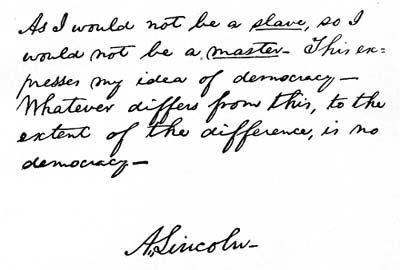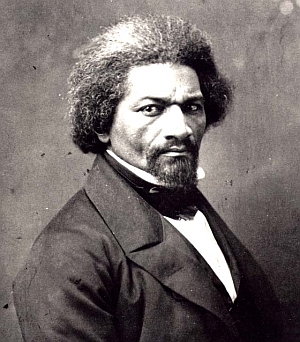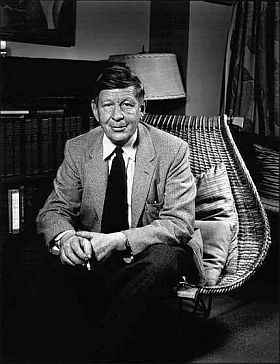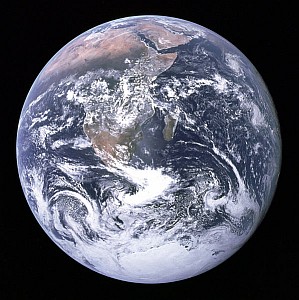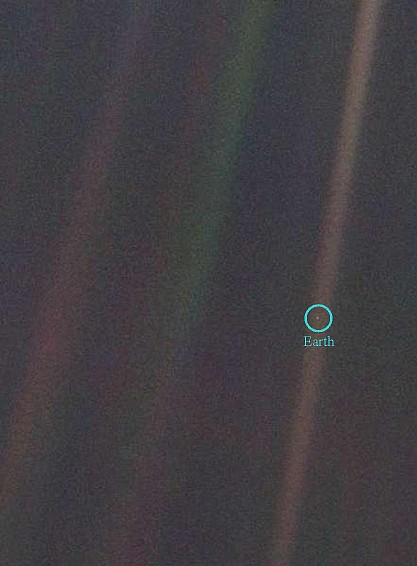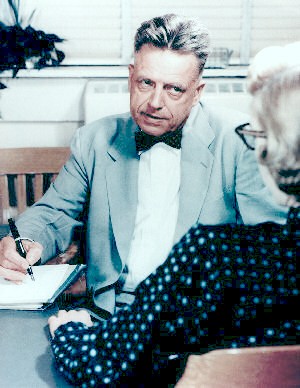|
To make a contented slave, If ignorance is bliss,
As I would not be a slave,
NOTES ON THE SONG What remark are we aiming to make about democracy exactly? This statement seems fairly clear to us: "As I would not be a slave, so I would not be a master. This expresses my idea of democracy."
However, this may leave the listener (or reader) to wonder, "What is a slave?"
We try to answer this question with the first two verses. We begin by providing the recipe for a "contented slave": one who has been made ignorant. Further, the person has been made fearful of seeking knowledge. So, we’ve hopefully already made a clear relationship between ignorance and slavery. Democracy is incompatible with slavery. Democracy, therefore, is incompatible with ignorance.
Why set bliss as equal to slavery? The inclination of many people might be to equate slavery with misery. So, the less obvious, and perhaps more "poetic," approach might be to equate slavery with bliss.
The Thomas Gray quote ("...where ignorance is bliss / 'Tis folly to be wise.") seems very relevant. Gray, we feel, makes an effective statement by going to the extreme he does (i.e., equating ignorance with bliss). We hoped we could make a more effective statement by employing a similar strategy.
Is there a way to escape this slavery, or can we overcome it? If so, how? Probably, the only hope we have to escape slavery is to learn as much as we can, with as much depth and breadth as possible. If so, anyone who helps deprive someone else of the ability to learn could be called a master; anyone who is deprived of the ability to learn could be called a slave.
It’s likely that many of us are both slave and master, of both ourselves and of others. Those who wish to be neither, then, might contribute, to the greatest extent possible, to self-learning and to helping others to learn. This, to us, means withholding as little information as possible from children, ourselves, and others. LYRICAL INSPIRATION Abraham Lincoln’s definition of democracy:
[source] * * * Frederick Douglass: During these leisure times, those old notions about freedom would steal over me again. When in Mr. Gardner's employment, I was kept in such a perpetual whirl of excitement, I could think of nothing, scarcely, but my life; and in thinking of my life, I almost forgot my liberty. I have observed this in my experience of slavery--that whenever my condition was improved, instead of its increasing my contentment, it only increased my desire to be free, and set me to thinking of plans to gain my freedom. I have found that, to make a contented slave, it is necessary to make a thoughtless one. It is necessary to darken his moral and mental vision, and, as far as possible, to annihilate the power of reason. He must be able to detect no inconsistencies in slavery; he must be made to feel that slavery is right; and he can be brought to that only when he ceases to be a man. NOTES ON THE BANJO Although the banjo as we know it derives from African ancestors, in the early nineteenth century people most often associated it with the United States, particularly with images of the South and African American slavery. It had been brought to the New World by enslaved Africans as early as the seventeenth century, but by the 1840s the instrument and its music were transformed by white, working-class musicians who made the banjo integral to a new popular entertainment, the minstrel show. Surrounded by other blackface performers on violin, tambourine, and bones, the banjoist anchored the minstrel line. Using a slightly more sophisticated instrument than those which African Americans had built from long-necked gourds, the banjo player provided the melodic line to the plantation songs and dances that urban audiences flocked to hear. Philip F. Gura
November, 1998
[Top] Perfection, of a kind, was what he was after,
[Top] I will try to describe for you [Top] I love you so much, my father. I will take this curse, my father.
Was it blood?
Or was it wine?
From the New International Version of the Bible:
From the Babylonian Talmud—Tractate Sanhedrin, 70a:
yayin = wine * * * Using the Bible to justify slavery. Everything we sense is natural: Still, I am much too firm in my Take it any way you like,
* * * "All my moral and intellectual being is penetrated by an invincible conviction that whatever falls under the dominion of our senses must be in nature and, however exceptional, cannot differ in its essence from all the other effects of the visible and tangible world of which we are a self-conscious part. The world of the living contains enough marvels and mysteries as it is—marvels and mysteries acting upon our emotions and intelligence in ways so inexplicable that it would almost justify the conception of life as an enchanted state. No, I am too firm in my consciousness of the marvelous to be ever fascinated by the mere supernatural which (take it any way you like) is but a manufactured article, the fabrication of minds insensitive to the intimate delicacies of our relation to the dead and to the living, in their countless multitudes; a desecration of our tenderest memories; an outrage on our dignity."—Joseph Conrad "Author's Note" The Shadow Line 1917 * * * "All hurricanes are acts of god, because god controls the heavens. I believe that New Orleans had a level of sin that was offensive to god, and they were recipients of the judgement of god for that." —John Hagee to Terry Gross on Fresh Air September 18, 2006 * * * "I cannot conceive of a God who rewards and punishes his creatures, or has a will of the type of which we are conscious in ourselves. An individual who should survive his physical death is also beyond my comprehension, nor do I wish it otherwise; such notions are for the fears or absurd egoism of feeble souls. Enough for me the mystery of the eternity of life, and the inkling of the marvelous structure of reality, together with the single-hearted endeavor to comprehend a portion, be it ever so tiny, of the reason that manifests itself in nature. "—Albert Einstein The World as I See It 1931 [Top]
1990 ce: Every "superstar," From four billion miles away, There's no sign of help
 the six planets Voyager was able to photograph in 1990 * * *
[Top]
We don't embody two distrinct groups:
Not all things are black or white.
The living world is a continuum
"Males do not represent two discrete populations, heterosexual and homosexual. The world is not to be divided into sheep and goats. Not all things are black nor all things white. It is a fundamental of taxonomy that nature rarely deals with discrete categories. Only the human mind invents categories and tries to force facts into separated pigeon-holes. The living world is a continuum in each and every one of its aspects. The sooner we learn this concerning human sexual behavior the sooner we shall reach a sound understanding of the realities of sex." Although Kinsey's statement speaks directly to the sexual behavior of human males, the "we" of the song applies to homo sapiens in general. [Top]
Are you ready to make thousands of dollars every week?
Stretch out your withered hand; it shall be restored.
Stop missing out— If I go and prepare a place for you,
* * * "Snake oil" refers to a substance of questionable medical value sold as a cure-all on little or no reasonable evidence, often by traveling confidence men. The term also refers generally to deceptive talk or actions with inflated promises to fulfill our strongest and often most unattainable desires.Other terms for snake oil are bunk, baloney, claptrap, chicanery, flim-flam, fraud, hoax, and humbug. If you have been sold snake oil, you may have been swindled, hosed, cheated, or bamboozled. Each verse in "Snake Oil" provides examples of promises, services and products that we believe can be fraudulent and physically, financially, emotionally or intellectually harmful. Not all of these frauds are commonly recognized as frauds: they are often presented deceptively as ancient, sacred or tried-and-true knowledge, and they prey on our fears and our desires to be powerful, rich, loved, and eternally healthy. The text of this song was drawn and re-worked from a variety of sources: internet advertisements for work-at-home job offers and pyramid sales schemes; literature and advertisements about faith healers, new age spiritual leaders and so-called psychic surgeons, such as Brazil's John of God; astrological horoscopes; self-help literature of a paranormal nature; a collection of tabloid headlines gathered by the late astronomer Carl Sagan in his 1996 book, The Demon-Haunted World: Science As a Candle in the Dark. The words to the final verse are attributed to Jesus in John 14:3-6 of the New Testament. [Top] Do you know the muffin man?
Do you know the milk man?
Do you know the brandy man?
Did you call CPS?
Do you know the cocaine man?
Do you know me?
[Top] |

